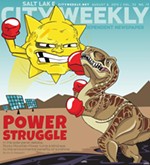"Napoleon Dynamite" Laughs with Its Characters, Not at Them
No artistic taste is more singular than the taste for what is funny. Given enough time, selected quotes and a few color-coded pie charts, I believe could convince many doubters that Dogville is not anti-American, that there is anti-gay text or subtext in nearly every film Mel Gibson has ever made or appeared in, and that Forrest Gump was a grotesque celebration of ignorance as bliss. But there’s not a chance in hell I could persuade, coax or cajole you into laughing at something you just don’t think is funny—especially if you’re convinced it’s only trying to be funny at the expense of its characters’ dignity.
At the 2004 Sundance Film Festival, no film inspired more passionate disagreement between two critical colleagues and myself than Napoleon Dynamite. One was from New York, the other from Chicago, and both found the film hopelessly condescending. Me, I was howling so loudly with laughter at my screening that I feared I’d attract wildlife from the Park City hills.
It surprises me little that many big-city critics are turning up their noses at Napoleon Dynamite, the feature debut of Jared Hess (co-scripted with his wife Jerusha). When confronted with stylized comedy about “flyover” regional characters—-see also: Fargo; About Schmidt; O Brother, Where Art Thou?—-many urban sophisticates tend to clench up. They can’t imagine that what they see isn’t meant as mockery.
Plenty of otherwise-discerning critics have dismissed Napoleon Dynamite as a big guffaw at the expense of the rural Idahoans Hess grew up with, and on one level you can understand the knee-jerk reaction that he has created a cartoon. Playing the title character—-a misfit student at Preston High School—-Jon Heder does resemble some long-lost cousin of Beavis and Butt-head. Gangly limbs make his body resemble a conglomeration of pipe cleaners; a buoyant red perm threatens to drift from his head; lips part in a perpetual gape.
Yet there’s something deeply affectionate and ultimately affirming in the episodic adventures of Napoleon and his loose tribe of friends and family. Napoleon’s nerdy older brother Kip (Aaron Ruell) looks for love in Internet chat rooms. Uncle Rico (Jon Gries) desperately tries to recapture 20-years-gone glory of his high school football days. Napoleon’s pal Pedro (Efren Ramirez) runs for class president against a popular cheerleader. Shy classmate Deb (Tina Majorino from Waterworld, all grown up) sells glamour shot photography services door to door. It’s hard to call any of them “sub-plots,” since that term would suggest a plot for them to be “sub-“ to.
What connects this band of outsiders is an infectious refusal to submit to the stratified expectations of small-town life. Napoleon may be an oddball—fond of sketching fantasy creatures in his notebooks and inept at romance—but he’s no loser. There’s an angry edge to his exasperated sighs and open disdain for Preston High’s bullies and cool cliques; he’s also a challenge to the environment of casual racism that follows Pedro. It’s hard to imagine more wonderfully evocative acts of defiance than Napoleon’s air kick at a guy who slams him into a locker, or hurling a campaign button for Pedro’s opponent down the school hallway. By the time Napoleon breaks into a dance routine at a school assembly in support of Pedro’s candidacy, it’s clear how much Hess loves this guy’s attitude.
It also helps that many of Hess’s individual gags are flat-out friggin’ hilarious. Napoleon participating in a sign-language performance of Bette Middler’s “The Rose;” Kip’s misadventures trying to sell plastic kitchenware; Napoleon’s success in a Future Farmers of America competition—it’s just inspired stuff. And that’s not even including the best use of the theme song from The A-Team in a movie, like, ever.
Does Hess overstuff the quirkiness envelope at times, like with a daredevil ATV-riding granny or Kip’s transformation after his Internet girlfriend comes to visit? Perhaps. But even then, the presumption that he’s out to turn his hometown into a punch line seems like an absurd over-reaction. Napoleon Dynamite’s small grace notes of outcasts finding unique connections together—-punctuated by a marvelous closing shot between Napoleon and Deb—-give the wild sense of humor a genuine heart, despite the almost paternalistic fretting of the coastal critics. I don’t know … maybe you had to be here.



